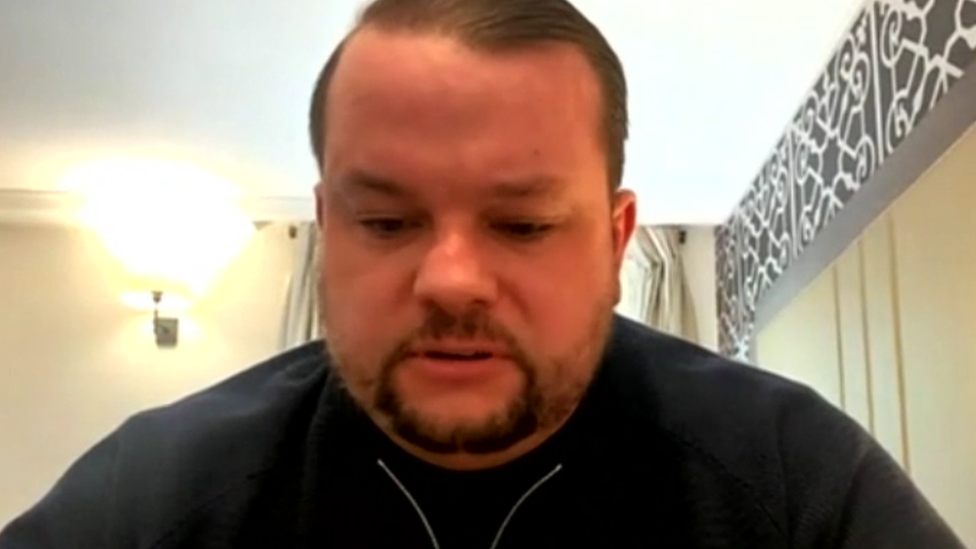Britons with Ukrainian family criticise visa bureaucracy
- Published
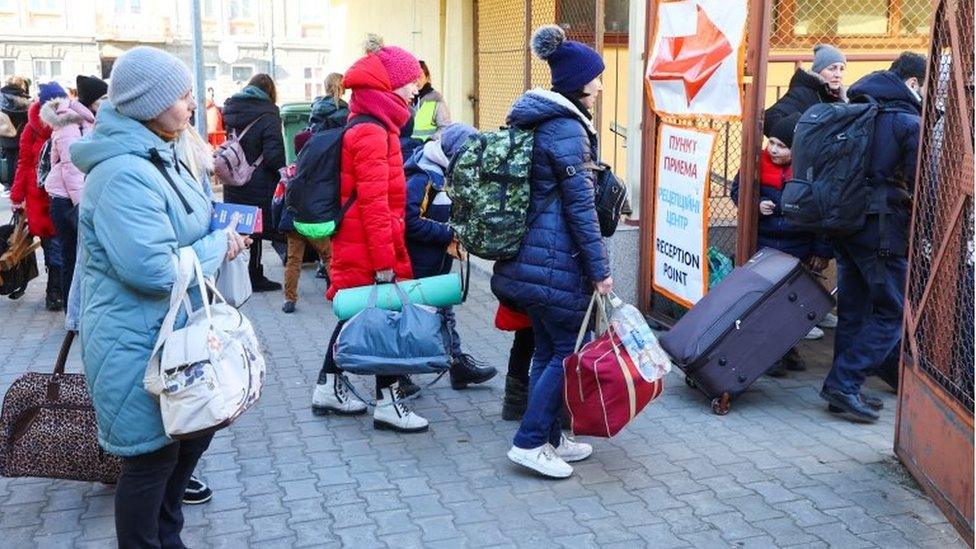
Ukrainians have been fleeing their country, with most of them first heading west to the Polish border
The difficulties faced by British families attempting to bring their Ukrainian relatives to safety in the UK have led to the Home Office's response being dubbed "totally chaotic" by one leading Labour MP. The BBC spoke to two women trying to help their loved ones get visas.

'I've spent two weeks crying'
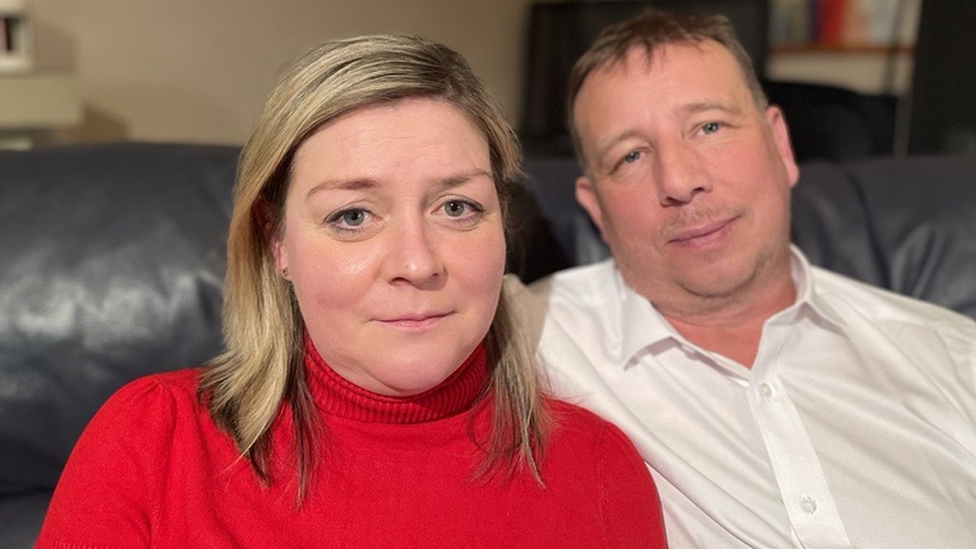
Yulia Garashchuk and her husband Richard Morris said the process of getting her cousin a visa has been exceptionally bureaucratic
Yulia Garashchuk says she didn't expect it to be so hard to help her cousin Dasha get a visa to come to the UK - at least not in war time.
The Russian had to go through a visa process herself before she could live in Deanshanger, Northamptonshire with her husband Richard Morris.
"I did it with my visas," she says, "but I didn't expect [it to be so hard] because it is war.
"It's a really difficult situation in Ukraine, and a lot of countries are being quicker, opening their doors and trying to help."
Mrs Garashchuk was born in Kyiv when it was still part of the Soviet Union. Her family later moved back to Russia and by the time she was seven years old they were living in Moscow.
She has family in both cities and blames Russian President Vladimir Putin for pitting former allies and friends against each other.
"It's Putin's war and he has put people who lived together on the path of war together. I can't understand it.
"Young military men who don't have any clue what they are doing, they go and conduct war. For what reason?"
The 42-year-old said her father's side of the family, who still live in Moscow, and her mother's, from Kyiv, are not currently speaking to each other.
"I've spent two weeks crying," she says. "I saw it [the invasion] coming but I couldn't believe or want to believe it.
"When it started I was in shock. I was worried about my family and thinking about them every single day."
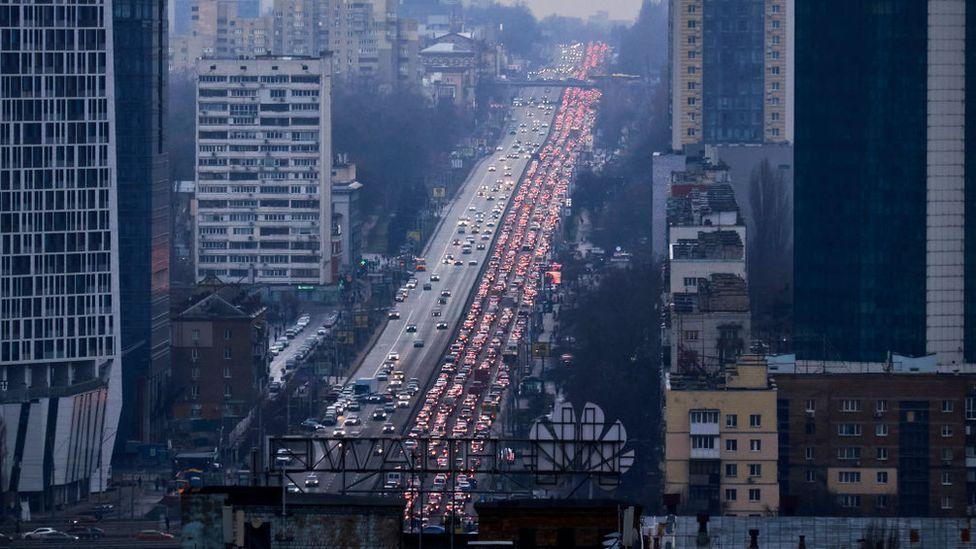
People in Kyiv fled the city following the Russian invasion
She says her family - she has 11 relatives in Ukraine - are getting used to "bombs on the street," sheltering in basements in their homes.
Her cousin Dasha, who is 35 and an accountant, was living in Kyiv with her nine-year-old son Danil when the Russian invasion began.
They had to flee their home with nothing but the clothes they were wearing and their passports.
It took 48 hours to drive to Lviv in western Ukraine, where Dasha applied for a visa last Sunday.
However, when she returned on Monday the application centre was closed and she was told she would have to apply again once she got to Poland.
Mrs Garashchuk said the application had been very hard to fill in, and had required a host of paperwork which they had to send over as Dasha had left home with nothing.
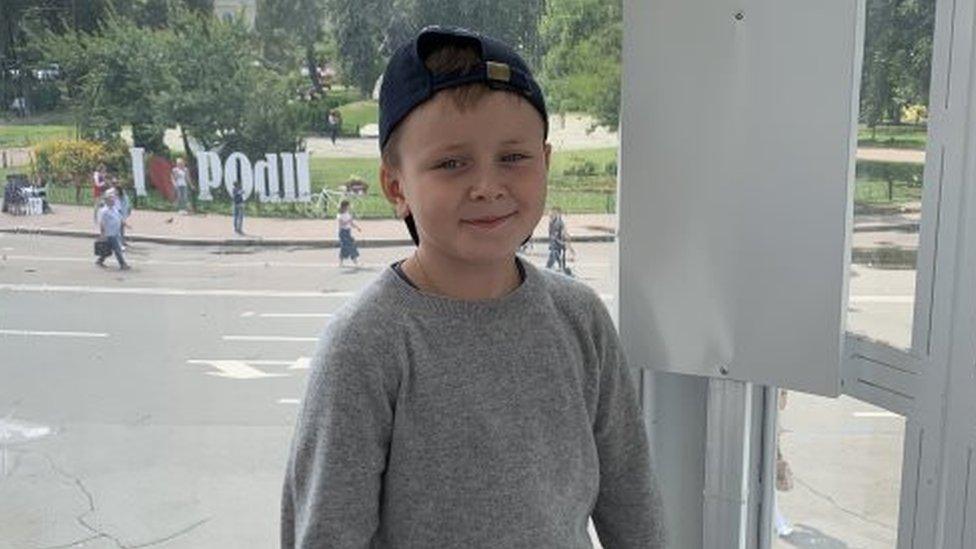
Dasha and her nine-year-old son Danil, pictured, spent 48 hours travelling to Lviv after leaving Kyiv
Dasha also had to use Google Translate to help her as the forms have to be done in English.
"It was very difficult," Mrs Garashchuk says. "She has an office in Lviv where she could go to do it, but how many people can't do that?
"People don't have computers or printers, but everything must be printed.
"I feel completely empty. All I want is for my family to be with me. I'm constantly worried, I can't sleep.
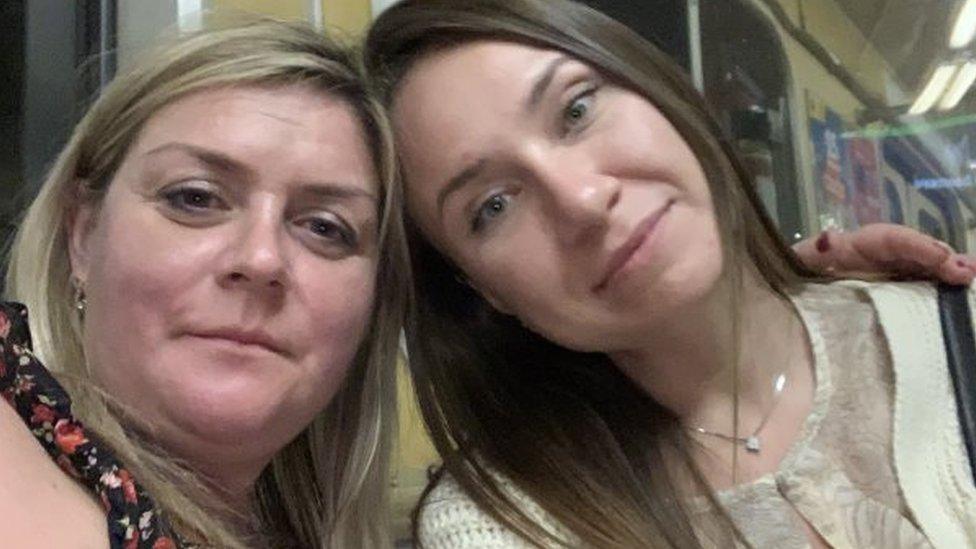
Yulia Garashchuk, left, and her cousin Dasha in happier times
"Can you imagine somebody, somewhere in different place, all alone with a nine-year-old. Without clothes, without stuff. It's just unbelievable."
Mr Morris says the visa process for his wife's family "has been full of exceptional bureaucracy.
"It's been painful, not to mention the fact we just don't know from one day to the next what is happening.
"We're trying to advise family members what to do and put their interests and safety first, but also we are trying to work through the red tape, give the best advice and prepare the documentation that's needed.
"You'd have imagined with it being a war situation things would have been somewhat easier, but it doesn't feel like that."

'I thought everything would be easy-peasy'
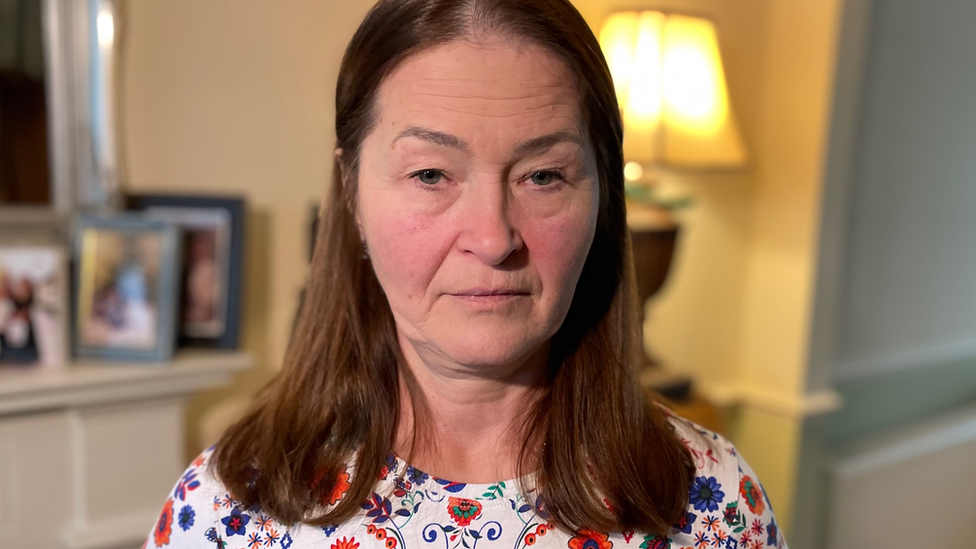
Liliya Andrij has been trying to help her daughter and two grandsons to get a visa
"We are not talking about a summer holiday," Liliya Andrij says. "British citizens, like me, are trying to get their family to England to a safe place.
"I want my two grandchildren and my daughter to be alive."
Ms Andrij, from Luton, is originally from Ukraine, but is a British citizen having lived in the UK for 15 years.
When the Russians brought war to her ancestral homeland, she flew to Poland to help her daughter Marta Sobolyuk get a British visa.
Mrs Sobolyuk, 38, and her sons, Danylo, 8, and Markyin, 14, crossed the Ukrainian border into Poland after the Russian invasion.
Ms Andrij says: "My son-in-law said 'Marta, I need you to be in a safe place so I can do what I can in Ukraine'.
"He got them into the car, to the border and they got to Poland.
"I flew out to Poland and helped get them to Warsaw. I just thought everything would be easy-peasy, but it didn't work that way."
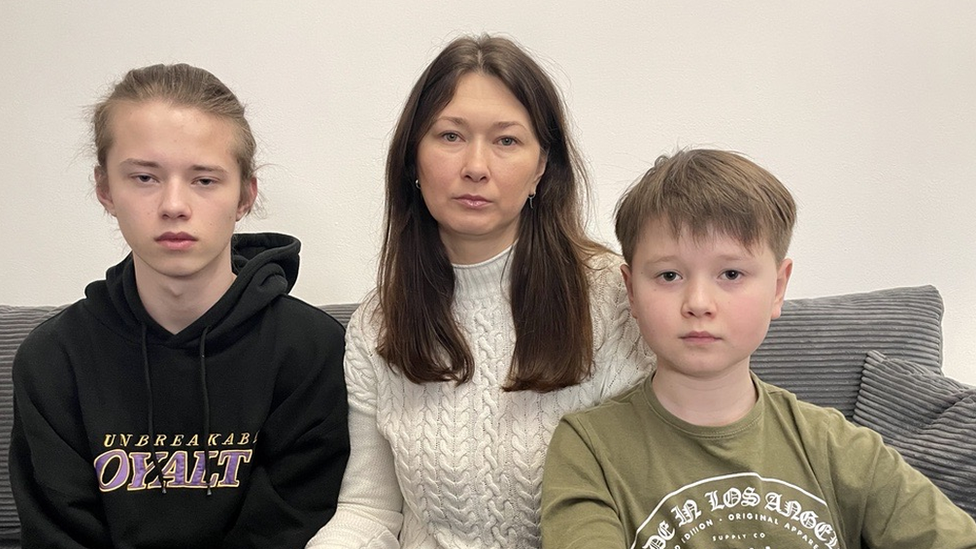
Marta Sobolyuk and her sons, Markyin and Danylo Senyk, are currently in Warsaw, Poland
She says her daughter submitted an application for a visa at the end of February. On 1 March the family handed their passports over, but so far they have had no reply.
"They are stuck in Poland," she says. "They can't go backwards or forwards. They have no passports.
"They are at the mercy of the Home Office which has their passports.
"Happiness is when you live in your own house, sleep in your own bed, eat from your own plate. When you are walking in your own street and you know this street.
"And outside is peace. At the moment they don't have anything."

'Standing shoulder to shoulder with Ukrainians'
Ukrainians with passports will be able to apply for UK visas online from Tuesday - Priti Patel
The Ukraine family scheme visa allows people to join an immediate or extended family member in the UK, providing that this relative has British nationality, indefinite leave to remain, settled status or proof of permanent residence.
But there has been widespread criticism of the response, with Labour's Yvette Cooper calling the Home Office "totally chaotic".
On Thursday, Home Secretary Priti Patel announced Ukrainian refugees who have passports will be able to apply for UK visas online.
The government said it has expanded its visa application capacity to 13,000 per week and deployed extra staff across the European Union.
A spokesperson said: "We are standing shoulder-to-shoulder with Ukrainians which is why we've made it easier for those with Ukrainian passports to come here.
"This is alongside changes to visas to ensure Ukrainians in the UK can stay here.
"A new sponsorship route, which will allow Ukrainians with no family ties to the UK to be sponsored to come here, is also being brought forward and all the measures we've put in place follow extensive engagement with Ukrainian partners.
"We will keep our support under constant review."

Find BBC News: East of England on Facebook, external, Instagram, external and Twitter, external. If you have a story suggestion email eastofenglandnews@bbc.co.uk, external
- Published10 March 2022
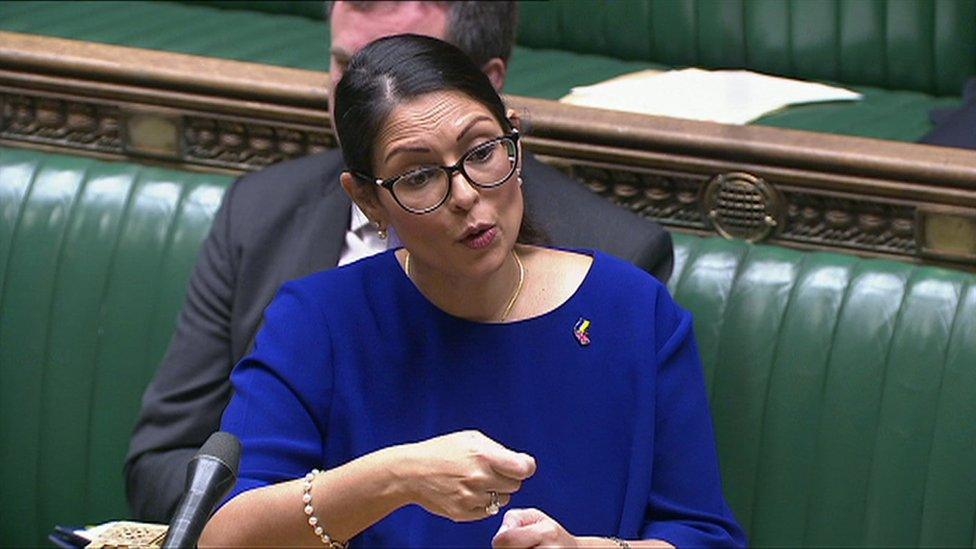
- Published10 March 2022
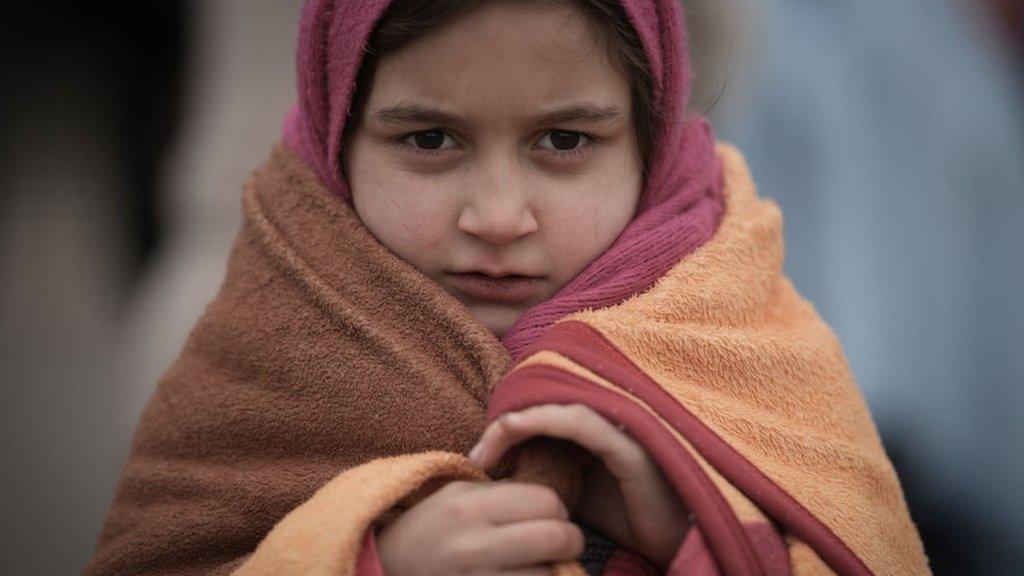
- Published9 March 2022
